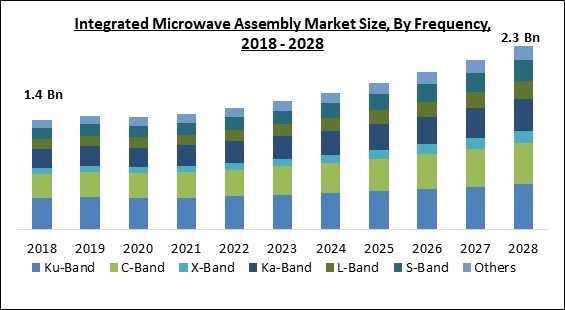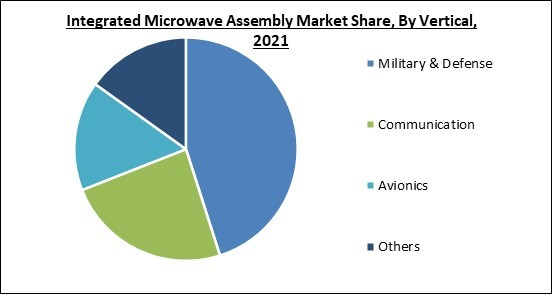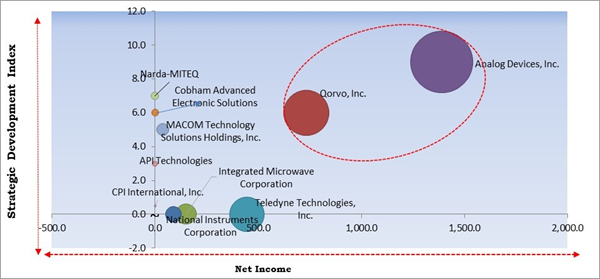Microwave components like attenuators, oscillators, switches, amplifiers, filters, couplers, and mixers, as well as the supporting electrical circuitry, are all combined into one overall assembly in these devices. The growth in data volumes and diversification of the variety of application domains is expected to require 5G capability in mobile as well as wireless communication systems. 5G systems are based on the advancement of existing technologies, as well as novel radio concepts that are built to satisfy new and challenging needs.
Essential services like e-banking, e-learning, and e-health is expected to continue to grow in popularity and become more convenient to use on mobile devices. Interactive television, Video on Demand, and broad wireless internet content, which is expected to gradually be supplied over mobile and wireless technologies, have been the subject of evolutionary research. These advancements can result in a tidal wave of mobile and wireless traffic, which is expected to multiply 1,000-fold during the coming years. Additionally, some applications is expected to place extra and highly diversified demands on mobile and wireless communication systems, which 5G must accommodate.
For a long period, numerous countries have embraced four generations of cellular communication systems, with each new generation appearing every 10 years or so. Existing base station designs must support many bands with numerous cell sites, with each site having multiple base stations.
With the International Telecommunications Union (ITU) ratifying the IMT-Advanced (IMT-A) standards and IMT-A, i.e., the fourth generation, wireless communication systems being deployed around the world, the 5G mobile and wireless communication technologies are finding their applications in a number of research fields. With the continued increase of Internet traffic, unprecedented numbers of heterogeneous and smart wireless devices will access forthcoming 5G wireless and mobile communication systems on the basis of the Internet Protocol Architecture of fourth-generation communication systems. As a result, contrasted to 4G communications networks, 5G communication systems are anticipated to have much greater wireless transmission speeds, like 10 Gbps peak data rates with 810 bps/Hz/cell.
COVID-19 Impact Analysis
The COVID-19 pandemic caused a severe impact on various economies all over the world. Several businesses were significantly devastated as a result of the outbreak of the COVID-19 infection. In addition, the governments of several countries were forced to impose lockdowns in their nations. As a result, the manufacturing units of numerous goods were temporarily shut down. Moreover, these lockdowns also caused a major disruption in the supply chain of various goods. Further, the COVID-19 led the worldwide healthcare industry to a significant failure due to the shortage of beds and oxygen in hospitals.
Market Growth Factors
Growing investment in the defense and military sector
The growing tension among two or more than two countries, such as the oil price war between Russia and Saudi Arabia and the drawdown of US military forces across Afghanistan, the global political environment is likely to remain unpredictable for a long time. To address this issue, regulatory agencies in several countries are requesting increased resources from their respective governments. Although defense expenditure around the world fell during the COVID-19 pandemic as governments focused their efforts on containing the virus and offering emergency aid, they may see a significant increase in the post-pandemic period.
High adoption of X-band Radar due to Network-centric Warfare
The defense sector is expanding due to the rising usage of network-centric warfare, or NCW, technologies. In order to obtain complete situational awareness and perfect synchronization between responders and sensors in a fast-paced environment, NCW was developed by the US military and needs a thorough integration of communication networks, sensors, command centers, and associated platforms. The integration of the bare minimum of information that must be transmitted is the objective of NCW.
Market Restraining Factors
Complexities in the operation of these devices
Despite all the advantages that are being offered by integrated microwave assembly, there are a few drawbacks that can hamper the overall operation and final outcome of the product. One of the major hurdles in the operation of integrated microwave assembly is the complexities that incur in devices. In electronic circuits, the integrated microwave assembly is made up of active components such as transistors and tubes, as well as passive components like resistors, isolators, and filters. As a result, architectural intricacy also generates complexities in comprehending the process of the operation of microwave goods, resulting in inefficient final outcomes.
Frequency Outlook
Based on Frequency, the market is segmented into Ku-Band, C-Band, X-Band, Ka-Band, L-Band, S-Band, and Others. In 2021, the Ku-band segment acquired the highest revenue share of the integrated microwave assembly market. The Ku-band, also called Kurz beneath, covers the frequency range of 12 to 18 GHz in the mid-frequency spectrum. It is utilized for satellite communication, particularly direct broadcast for television, the space shuttle, and marine and industrial control systems. The ability to modify the uplink and downlink, as well as the lower cost, is anticipated to augment the employment of integrated microwave assembly devices with Ku-band frequencies. The benefits of this band, like faster connection speeds, more bandwidth, and clearer images and audio, make it an excellent choice for satellite communication.
Vertical Outlook
Based on Vertical, the market is segmented into Military & Defense, Communication, Avionics, and Others. In 2021, the communication segment garnered a substantial revenue share of the integrated microwave assembly market. The rapidly surging growth of this segment is attributed to the increasing demand for enhanced and effective communication technologies in the telecommunication and IT organizations. In addition, governments across various developing and developed countries all over the world are increasing their investment in the IT and telecommunication sector, which is expected to propel the growth of the integrated microwave assembly market in this vertical.
Product Outlook
Based on Product, the market is segmented into Amplifiers, Frequency Converters, Oscillators, Frequency Synthesizers, Transceivers, and Others. In 2021, the amplifiers segment procured the largest revenue share of the integrated microwave assembly market. Amplifiers are in high demand due to rapid changes in the infrastructure of the telecom sector as the industry shifts to 5G technology while also expediting the penetration of 4G/LTE connectivity. For new technologies like 5G and LTE to gain traction, more cell sites are required, resulting in a surge in the demand for base stations as well as backhaul equipment to serve these sites. This factor is majorly responsible for the increasing growth of the segment.
Regional Outlook
Based on Regions, the market is segmented into North America, Europe, Asia Pacific, and Latin America, Middle East & Africa. In 2021, Asia-Pacific held a significant revenue share of the integrated microwave assembly market. The growth of the regional market is expediting due to various factors, including higher adoption rate of smartphones, the increasing requirement for high-speed mobile technologies including 5G, higher usage of social media as well as e-commerce platforms, and growing military expenditures by various regional countries across Asia-Pacific, such as India, China, and Japan.
Integrated Microwave Assembly Market Competition Analysis
The major strategies followed by the market participants are Partnerships. Based on the Analysis presented in the Cardinal matrix; Analog Devices, Inc. and Qorvo, Inc. are the forerunners in the Integrated Microwave Assembly Market. Companies such as MACOM Technology Solutions Holdings, Inc., Cobham Advanced Electronic Solutions, Teledyne Technologies, Inc. are some of the key innovators in the Market.
The market research report covers the analysis of key stake holders of the market. Key companies profiled in the report include Analog Devices, Inc., Teledyne Technologies, Inc., National Instruments Corporation, Qorvo, Inc., MACOM Technology Solutions Holdings, Inc., Cobham Advanced Electronic Solutions, CPI International, Inc., API Technologies, Integrated Microwave Corporation (Knowles Precision Devices) (Knowles Corporation), and Narda-MITEQ (J.F.Lehman & Company).
Recent Strategies Deployed in Integrated Microwave Assembly Market
Partnerships, Collaborations and Agreements:
- Mar-2020: CAES partnered with Trident Systems, a leader in providing multi-function RF and processing solutions. Under this partnership, the companies is expected to provide an integrated range of advanced mission computing and communications solutions for applications including sea, air, defense applications, and space.
- Oct-2020: Analog Devices partnered with NEC, multinational information technology and Electronics Corporation based in Japan. Through this partnership, the companies aimed to develop a 5G Network Massive MIMO Antenna Radio Unit for Rakuten Mobile. Moreover, the new radio band is expected to comprise a wideband RF transceiver solution of Analog Devices along with NEC"s 5G open vRAN interface corresponding to the fully virtualized cloud-native mobile network of Rakuten Mobile.
- Jun-2020: Qorvo teamed up with X-Microwave, a vendor of a modular RF and microwave design system. Under this collaboration, the companies is expected to offer modular building blocks to microwave and RF engineers with the purpose to allow them to examine components production applications during prototyping.
- Feb-2019: MACOM joined hands with STMicroelectronics, a French-Italian multinational electronics and semiconductors manufacturer. Following this collaboration, the companies aimed to expand 150mm GaN-on-Silicon production capacity in ST's fabs along with 200mm as demand requires. Moreover, the expansion is expected to serve 5G Telecom buildout across the world.
Acquisitions and Mergers:
- Jan-2022: MITEQ acquired Intelligent RF Solutions, a leader in global defense and intelligence missions. This acquisition aimed to significantly expand MITEQ"s product range with increased emphasis on system and subsystem capabilities for SIGINT/ELINT/EW applications.
- Oct-2021: CAES took over Colorado Engineering, a leader in Radio Frequency and high-performance computing solutions. Through this partnership, the companies is expected to integrate CEI's expertise in complex commercial and defense systems along with their excellence in digital, analog, RF analog software and hardware solutions into advanced RF, millimeter, and microwave wave manufacturing and expertise capabilities in advanced electronics for Defense and Aerospace industry.
- Jul-2020: Analog Devices took over Maxim, a leader in linear and mixed-signal integrated circuits. Through this acquisition, the company aimed to expand its footprint in the integrated circuits market along with increasing its sales of power management systems, digital processors and sensors, analog and mixed-signal integrated circuits, and, radio frequency products.
- Feb-2020: Qorvo acquired Custom MMIC and Decawave. Through this acquisition, the company aimed to integrate die and packaged components of Custom MMIC in order to propel its power amplifiers to allow multi-chip modules for a wide range of aerospace, defense, and commercial applications.
Product Launches and Product Expansions
- Dec-2021: Analog Devices rolled out the RadioVerse System-on-Chip Series, a new product range of the company. With this launch, the company aimed to offer a cost-effective and agile platform to radio unit developers in order to allow them to bring energy-efficient 5G radio units across the industry. The new product line offers cutting-edge radio frequency signal processing along with increased digital functionality as well as RF capacity.
- Jun-2021: APITech introduced printed filters into its filter-based integrated microwave assemblies product range. With this launch, the company aimed to expand its reach across the emerging market of printed electronics with a rugged low-profile package with a frequency range of 2 to 40 GHz in Highpass, Lowpass, Bandreject, and Bandpass.
- Apr-2021: MACOM rolled out MACOM PURE CARBIDE, a new product line of Gallium Nitride on Silicon Carbide power amplifier. Following this partnership, the company is expected to provide custom and standard MACOM PURE CARBIDE power amplifier solutions to its customers.
- Jun-2019: MITEQ introduced the LCDRO, a new product in its DRO Series product line. The new product is a free-running DRO leveraged in various microwave radar as well as radiofrequency applications for military and commercial markets.
Geographical Expansions
- Jun-2021: CPI International expanded its geographical footprint in Canada with the introduction of its 125,000 square foot infrastructure in Georgetown with an additional 62,000 square feet. With this geographical expansion, the company aimed to meet the constant demand for satellite and medical communications goods manufactured in the facility.
Scope of the Study
Market Segments Covered in the Report:
By Frequency
- Ku-Band
- C-Band
- X-Band
- Ka-Band
- L-Band
- S-Band
- Others
- Military & Defense
- Communication
- Avionics
- Others
- Amplifiers
- Frequency Converters
- Oscillators
- Frequency Synthesizers
- Transceivers
- Others
By Geography
- North America
- US
- Canada
- Mexico
- Rest of North America
- Europe
- Germany
- UK
- France
- Russia
- Spain
- Italy
- Rest of Europe
- Asia Pacific
- China
- Japan
- India
- South Korea
- Singapore
- Malaysia
- Rest of Asia Pacific
- LAMEA
- Brazil
- Argentina
- UAE
- Saudi Arabia
- South Africa
- Nigeria
- Rest of LAMEA
Key Market Players
List of Companies Profiled in the Report:
- Analog Devices, Inc.
- Teledyne Technologies, Inc.
- National Instruments Corporation
- Qorvo, Inc.
- MACOM Technology Solutions Holdings, Inc.
- Cobham Advanced Electronic Solutions
- CPI International, Inc.
- API Technologies
- Integrated Microwave Corporation (Knowles Precision Devices) (Knowles Corporation)
- Narda-MITEQ (J.F.Lehman & Company)
Unique Offerings from the Publisher
- Exhaustive coverage
- The highest number of Market tables and figures
- Subscription-based model available
- Guaranteed best price
- Assured post sales research support with 10% customization free
Table of Contents
Companies Mentioned
- Analog Devices, Inc.
- Teledyne Technologies, Inc.
- National Instruments Corporation
- Qorvo, Inc.
- MACOM Technology Solutions Holdings, Inc.
- Cobham Advanced Electronic Solutions
- CPI International, Inc.
- API Technologies
- Integrated Microwave Corporation (Knowles Precision Devices) (Knowles Corporation)
- Narda-MITEQ (J.F.Lehman & Company)











